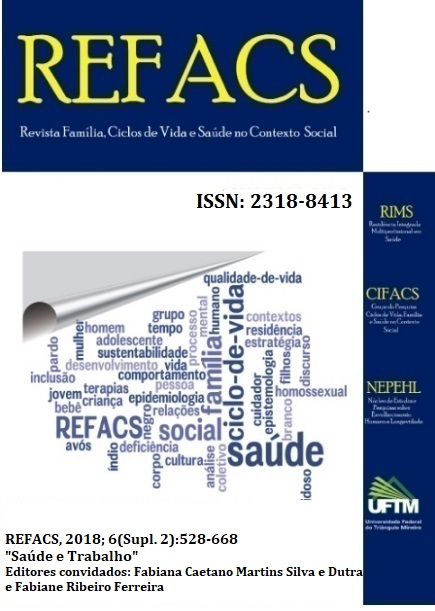Aplicabilidade do cicloergômetro no controle da síndrome do imobilismo durante a terminalidade
DOI:
https://doi.org/10.18554/refacs.v6i0.2681Palavras-chave:
Cuidados paliativos, Fisioterapia, Exercício, FadigaResumo
O objetivo do presente estudo foi verificar as publicações acerca da utilização do cicloergômetro nos pacientes em cuidados paliativos. Trata-se e uma revisão realizada nas bases de dados: SciELO; PEDro e PubMed. Foram utilizados os descritores: Cuidados Paliativos; Fisioterapia; Exercício e Fadiga. Aplicou-se o sistema booleano utilizando a técnica de cruzamento dos descritores. Como estratégia de seleção realizou-se a leitura dos títulos e resumos, considerando os seguintes critérios: período de publicação do ano de 2013 a 2017; artigos nos idiomas português e inglês; abordagem do exercício físico em CP. Assim, do resultado inicial de 16 artigos, foram selecionados oito artigos que abordavam os critérios citados. O exercício físico aeróbio associado ao anaeróbio apresentou-se nas publicações gerando benefícios sobre a fadiga e síndrome do imobilismo. No entanto, não se encontrou estudos que investigaram a utilização do cicloergômetro em pacientes sob cuidados paliativos.
Referências
Lee H, Ko YJ, Suh GY, Yang JH, Park CM, Jeon K, et al. Safety profile and feasibility of early physical therapy and mobility for critically ill patients in the medical intensive care unit: Beginning experiences in Korea. J Crit Care 2015; 30(4):673-77.
Pyszoral A, Budzyński J, Wójcik A, Prokop A, Krajnik M. Physiotherapy programme reduces fatigue in patients with advanced cancer receiving palliative care: randomized controlled trial. Support Care Cancer. 2017; 25:2899-908.
Peters MEWJ, Goedendor MM, Verhagen CAHHVM, Bleijenberg,G, Van der Graaf WTA. Fatigue and its associated psychosocial factors in cancer patients on active palliative treatment measured over time. Support Care Cancer. 2016; 24:1349-55.
Pires-Neto RC, Kawaguchi YMF, Hirota AS, Fu C, Tanaka C, Caruso P, et al. Very early passive cycling exercise in mechanically ventilated critically ill patients: physiological and safety aspects-a case series. PLos ONE. 2013; 8(9):741-82.
Kho ME, Martin RA, Toonstra AL, Zanni JM, Mantheiy EC, Nelliot A, et al. Feasibility and safety of in-bed cycling for physical rehabilitation in the intensive care unit. J Crit Care. 2015; 30(6):1419e1-5.
Meneses EF, González JE, Ramírez VR. Effects of supervised exercise on cancer-related fatigue in breast cancer survivors: a systematic review and meta-analysis. BMC Cancer. 2015:15-77.
Machado AS, Pires-Neto RC, Carvalho MT, Soares JC, Cardoso DM, Albuquerque IM. Efeito do exercício passivo em cicloergômetro na força muscular, tempo de ventilação mecânica e internação hospitalar em pacientes críticos: ensaio clínico randomizado. J Bras Pneumol. 2017; 43(2):134-139.
Cordeiro AL, Barbosa, AFN, Leitão LP, Araújo PAS, Carvalho S. Efeitos hemodinâmicos do treino em ciclo ergômetro em pacientes no pós-operatório de cirurgia cardíaca. Rev DERC. 2014; 20(3):90-3.
Vieira LC, Reis JRG, Brito SG. Análise dos efeitos do cicloergômetro de membros inferiores na função cardiorrespiratória em pacientes submetidos à drenagem pleural. Perquirere. 2014; 11(2):179-89.
Litterini AL, Fieler VK, Cavanaugh JT, Lee BQ. Differential effects of cardiovascular and resistance exercise on functional mobility in individuals with advanced cancer: a randomized trial. Arch Phys Med Rehabil. 2013; 94(12):2329-35.
Albrecht TA, Taylor AG. Physical activity in patients with advanced-stage cancer: a systematic review of the literature. Clin J Oncol Nurs. 2012; 16(3):293-300.
Downloads
Publicado
Edição
Seção
Licença
Este trabalho está licenciado sob uma licença Creative Commons Attribution-NonCommercial 4.0 International License.



